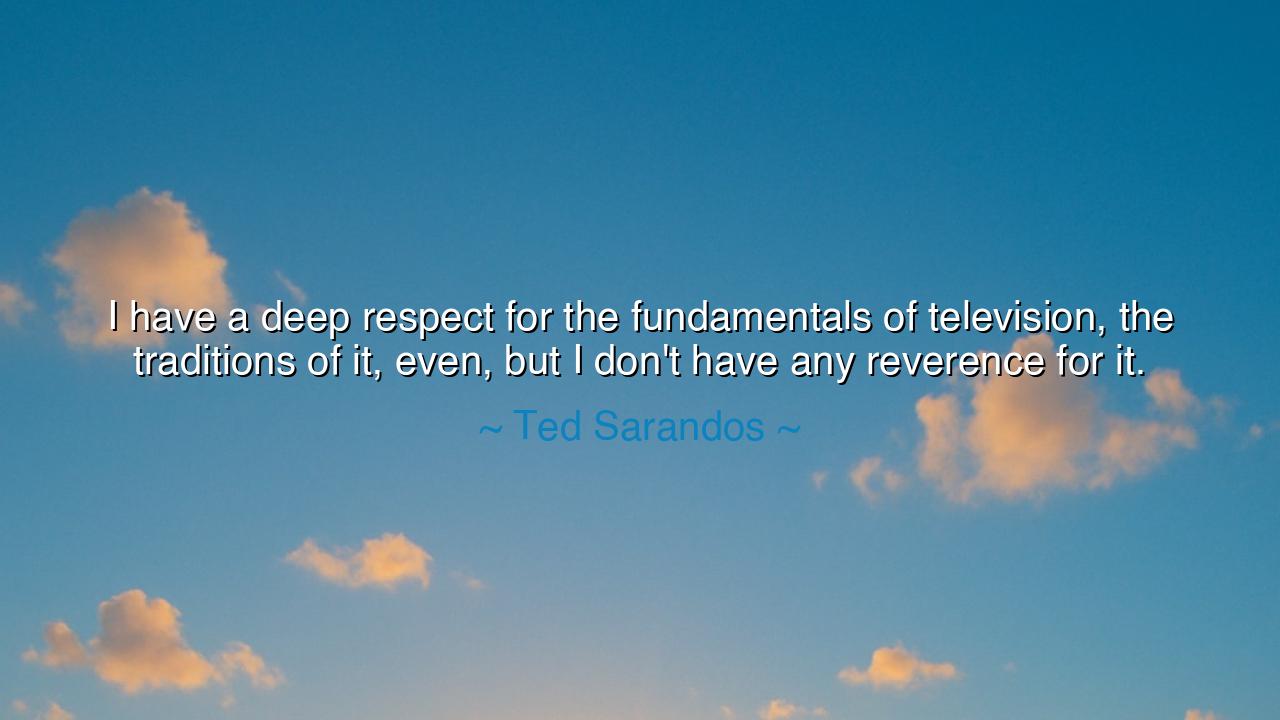
I have a deep respect for the fundamentals of television, the
I have a deep respect for the fundamentals of television, the traditions of it, even, but I don't have any reverence for it.






In the words of Ted Sarandos we hear both reverence and rebellion: “I have a deep respect for the fundamentals of television, the traditions of it, even, but I don’t have any reverence for it.” This statement, though spoken in the realm of entertainment, carries the weight of an eternal principle: to honor the roots of a craft without allowing those roots to bind the future. For it is the fate of every art, every science, every tradition to either grow beyond its origins or wither in its own nostalgia.
To hold respect for the fundamentals is to recognize the foundation upon which all is built. Just as the architect must honor the laws of gravity, or the musician must honor rhythm and harmony, so too must the creator in television understand pacing, storytelling, and the craft of performance. Without such respect, innovation collapses into chaos. But Sarandos distinguishes this from reverence, which can become idolatry, freezing an art form in amber, worshiping the past instead of building the future. His words remind us that respect preserves wisdom, while reverence risks becoming a chain.
The history of the arts is filled with this tension. When Impressionist painters broke from the traditions of the academies, they respected color, form, and light, but refused to revere the rigid rules of portraiture and history painting. They were scorned at first, but their refusal to bow down to tradition birthed an entirely new vision of beauty. So too with jazz musicians, who respected rhythm and melody yet shattered old patterns to create improvisation. In every age, progress arises from this delicate balance: honoring fundamentals, but daring to transgress reverence.
In Sarandos’s world, the world of television, this truth is especially poignant. For decades, television followed strict traditions—time slots, network dominance, advertising breaks. But technology broke open those forms. Streaming, on-demand viewing, and global platforms redefined what television could be. If Sarandos had been reverent to tradition, Netflix might have remained a DVD service, chained to the old model. By choosing respect without reverence, he honored the craft of storytelling while daring to reimagine how it could reach the world.
The deeper meaning here is that progress requires both humility and courage. Humility to recognize that we are not the first, that others before us have built the pillars we stand upon. But courage to step beyond, to risk failure, and to challenge the sacred cows of convention. Sarandos embodies this spirit: he bows to the traditions enough to learn from them, but he refuses to kneel so deeply that he cannot walk forward. This, too, is the way of innovators across time.
Consider also the story of Galileo, who respected the mathematics and traditions of astronomy but refused to revere the dogma that placed Earth at the center of the cosmos. His respect gave him grounding; his refusal of reverence gave him vision. Though condemned in his time, he transformed the world’s understanding forever. The lesson is the same: reverence without question may preserve stability, but it smothers discovery. Respect, balanced with boldness, opens the gates to progress.
The lesson for us, then, is clear. In whatever field you labor—art, science, work, or family—learn the fundamentals, respect the traditions, for they hold wisdom forged by time. But do not let reverence trap you in imitation. Question, explore, and innovate. If something no longer serves life, dare to discard it. For respect honors the past, but freedom builds the future.
Thus Sarandos’s words, though spoken of television, apply to all who wish to live creatively and courageously. Respect the fundamentals, but do not worship them. Honor tradition, but do not become its servant. For life itself is not meant to be repeated endlessly, but to be renewed in every generation, by those who carry the torch of respect forward into the fire of transformation.






AAdministratorAdministrator
Welcome, honored guests. Please leave a comment, we will respond soon